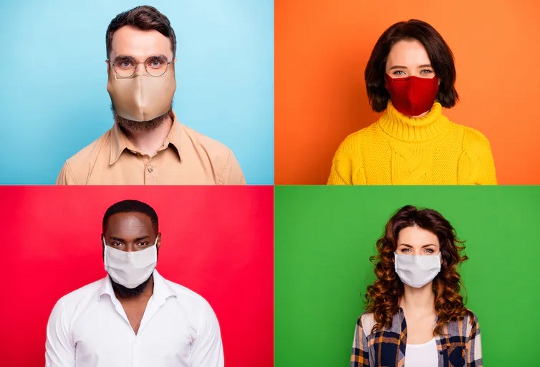 Check your mask for fit, filtration and breathability. Roman Samborskyi/Shutterstock
Check your mask for fit, filtration and breathability. Roman Samborskyi/Shutterstock
The emergence of new, potentially more infectious, coronavirus variants has led many people to worry about the effectiveness of their masks in protecting themselves and other people from catching COVID-19. Some experts are recommending people wear two masks in order to increase the protection.
Masks have been the subject of much debate since the pandemic began. Today, most governments and health bodies recommend we wear them to prevent the transmission of COVID-19.
But not all masks are the same, and not all are widely available. At the start of the pandemic, the global shortage of personal protection equipment, including masks, led to the mass uptake of reusable fabric face coverings.
Soon after, in every shop, place of worship, restaurant, public transport and other common areas, different face coverings appeared, and along with them different problems. Now, every day, we see masks that do not fit properly, masks that slip down the face when talking, masks that fog up our glasses or irritate the skin behind the ears, never mind the eternal question of where we should keep your masks when we take them off.
Get The Latest By Email
Part of the problem has been a lack of official guidance on what makes a good mask. But at the end of last year, the World Health Organization published a guidance document, which addressed three important elements for the factory manufacture of fabric face masks. The guidance sets out minimum thresholds for fit, filtration and breathability.
Here, we explain why these three elements are important and why you should think about what mask you wear and how you wear it.
Does your mask fit?
 Leakage is one of the major problems in mask effectiveness. Henriquez, Cousins Burleigh, MacKay
Leakage is one of the major problems in mask effectiveness. Henriquez, Cousins Burleigh, MacKay
Face mask fit is critical in order to prevent gaps between the skin and mask so that, when breathing, the aerosols do not get diverted through the gaps, for example those around our nose. This phenomenon is called “leakage”. Our research has also indicated that leakage is one of the major problems in mask effectiveness.
With a diverse range of facial features and profiles, it is easy to see why – a mask design that fits snugly over one person’s nose will leave big gaps over another’s. The wire embedded around the nose section even when pressed can move and cause gaps when talking and also gaps can form around the cheek and jaw bone.
So one of the most important things to check is how your mask fits your face. Is there a lot of air escaping through the top or sides? If so, consider buying a mask of a different size that fits more snugly over your mouth and nose.
How does it filter particles?
The question of leakage goes hand-in-hand with the ability of face masks to filter out the infectious agents in aerosols and droplets while still allowing the user to breathe properly.
To address filtration, we need to determine how aerosols can penetrate through different masks. Masks work by modulating air-flow through the fabric, reducing the number of particles passing through in each direction.
Many different materials are used in masks, including cloth, different types of polymers and nanofibers. Surgical masks are made from layers of polypropylene, which is a plastic material.
Different cloths have been tested for filtration efficacy with multiple layers of polyester and cotton proving the most effective. So it’s worth checking what your mask is made of when purchasing it. Also, don’t be too worried about washing your fabric face mask. Preliminary results from our research show that good filtration fabrics actually improve in their filtration ability over time and are effective up to 50 washes.
Is it comfortable?
Breathability and comfort are also critical to to encourage people to wear their masks properly.
Reports suggest that users can experience headaches, facial itching and perceived difficulty in breathing due to increased skin and air temperature when wearing masks.
If our masks are uncomfortable, it’s more likely we won’t wear them properly, and that can contribute to the spread of COVID-19. So make sure your mask doesn’t make you so uncomfortable that you have to periodically remove it, which risks undermining all your good work.
Finding the best face mask
How do we make sure that we are wearing the best face mask covering to prevent transmission? We have been working with industry groups to address this issue and improve design, assess fabric filtration and raise awareness of the importance of the three key elements.
The good news is that our preliminary data shows that reusable fabric face masks and coverings are capable of achieving excellent filtration of particles that produce good seals to reduce the risk of leaks on different facial profiles. The use of reusable face masks also reduces the amount of single-use surgical face mask waste, which is a growing problem.
Based on the World Health Organization guidance, and our research, we can say that as long as your mask fits you snugly and comfortably, with minimal leakage, you can feel confident in wearing it, even with the rise of new variants of the virus.
About The Authors
Fiona Henriquez, Professor of Parasitology, University of the West of Scotland; Mia Cousins Burleigh, Senior Technician, University of the West of Scotland, and William MacKay, Reader in Healthcare Acquired Infections, University of the West of Scotland
This article is republished from The Conversation under a Creative Commons license. Read the original article.
books_health







